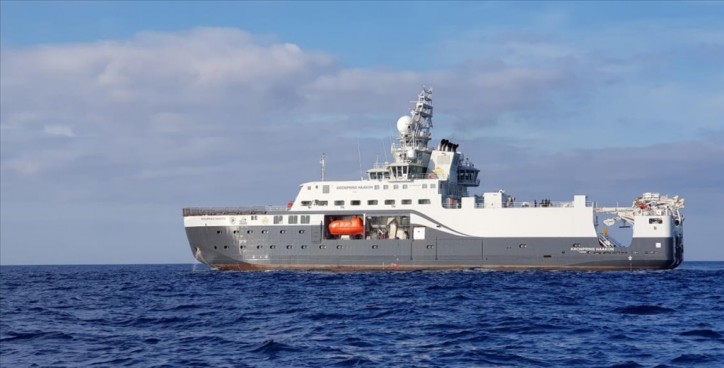Optimarin yesterday revealed that it has installed its USCG-approved ballast water treatment (BWT) technology on the Norwegian Polar Institute’s newbuild research vessel Kronprins Haakon.
The 100m long, Fincantieri-built, state-of-the-art PC 3 icebreaker will be christened on 17 November, before going on to undertake year-round scientific assignments in ice-covered waters. Its 167 m³/h Optimarin Ballast System (OBS) will ensure optimal environmental stewardship, eliminating all organisms carried in ballast water, and complete global compliance.

Tore Andersen, Optimarin CEO, says his firm is thrilled to play a role in a project that is important both for Norway and the wider world.
“Kronprins Haakon is Norway’s first purpose-built polar research vessel in 100 years and a vital tool in society’s quest to understand, and protect, the fragile polar and marine environments,” he says. “With such an important mission it is crucial that it operates with optimal reliability, efficiency and environmental standards, and therefore requires high quality and market proven equipment and systems.
“OBS, with its simple, effective and ‘tried and tested’ UV-based technology is the perfect solution in this regard. It promises leading global compliance, trouble free maintenance and long-term performance, day in, day out. As such the vessel crew and scientists can concentrate on what’s really important – operating in challenging conditions and gathering data – safe in the knowledge their BWT system is always working to protect the environment.”
Kronprins Haakon is owned by the Norwegian Polar Institute, with the Institute of Marine Research assuming operational responsibility, while the Arctic University of Tromsø will be the main user. The NOK 1.4 billion (USD 167 million) ship can break through 1m thick ice, has 15 laboratories, a moonpool, and is equipped for ROV, AUV and helicopter operations. Accommodation on-board can house up to 17 crew members and 35 scientists, while the ship has the capacity to operate for 65 days at a cruising speed of 15 knots. It is Norway’s first purpose built polar research vessel since Roald Amundsen’s 'Maud' in 1917.
The news comes at a busy time for Optimarin, the world’s first company to install a commercial BWT system (in 2000 on-board the Princess Regal). At the end of last month the Norwegian-headquartered firm signed a retrofit agreement with Höegh Autoliners for 10 systems, after agreeing a contract with Ardmore for 36, while also recently receiving news that its technology was the choice of the United States Coast Guard itself for its new Offshore Patrol Cutter programme.
“It’s gratifying to see that the shipowners and public sector organisations with the very highest environmental standards are choosing our system as their ‘go-to’ BWT solution,” Andersen concludes. “We’ve been focused exclusively on this sector since 1994 and that expertise is now priceless for an industry that must conform to IMO and USCG regulations to maintain a licence to operate. Prestigious contracts like the Kronprins Haakon are obviously noteworthy, but every ship must comply and fight against the tide of invasive species carried in untreated ballast. We’re committed to helping owners achieve those goals.”
Optimarin has now sold well over 650 systems, with more than 500 installed and operational. Of these, over 200 have been retrofits delivered in collaboration with global engineering partners. OBS has certification from a comprehensive range of classification organizations, including ABS, BV, DNV-GL, LR & MLIT Japan.
Source: Optimarin